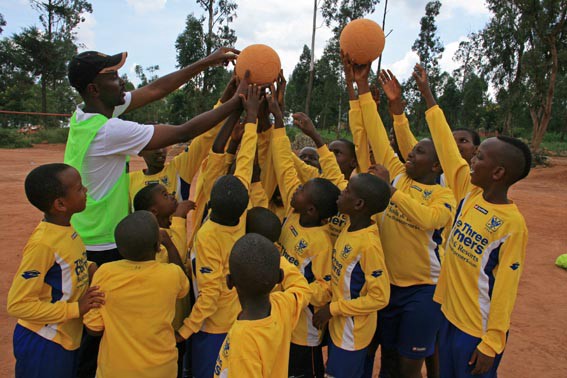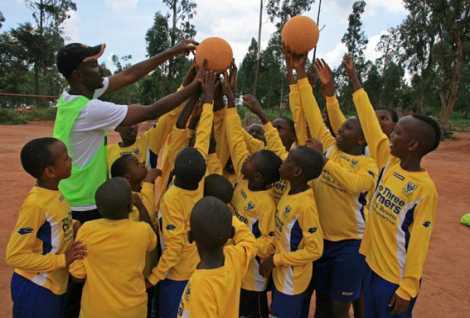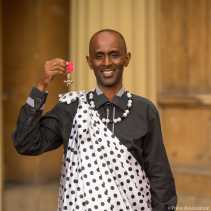Survivor of the 1994 Genocide Against the Tutsi in Rwanda Promotes Peace Through Soccer

 Eric Murangwa and members of his soccer club at Dream Team Football Academy in Kigali.
Eric Murangwa and members of his soccer club at Dream Team Football Academy in Kigali.But far from coming out of nowhere, the madness that broke out on April 7 had been building for decades.
This is one of the messages that Eric Murangwa – a former soccer star who survived the genocide and has become a recognized human-rights advocate – tries to impart to his audiences.
Murangwa warns that many of the precursors to the genocide against the Tutsi are evident today in Europe and the UK, where he now lives.
“Tutsis were called cockroaches, foreigners, snakes – all kinds of things,” he said, speaking by phone last week with USC Shoah Foundation from his home in the UK. “This kind of language is being used against migrants, against Muslims (in the UK). It’s scary.”
Although the 42-year-old Murangwa is not among the 86 Rwanda survivors whose testimonies are in USC Shoah Foundation’s Visual History Archive, the Institute is including his story in its Genocide Awareness Month coverage because his work aligns with the Institute’s mission to develop empathy, understanding and respect.
The former goaltender for a Rwandan team called Rayon Sport literally owes his life to soccer. On multiple occasions, Murangwa’s affiliation with the team during the mayhem of 1994 persuaded would-be killers to spare him.
In 2010, he founded a nonprofit youth organization that pairs soccer with education about the Holocaust and other genocides, as well as the importance of tolerance, reconciliation and unity. In recent years he has also used his platform to sound the alarm about rising anitsemitism, Islamaphobia, xenophobia and hate.
In January Murangwa was recognized by Queen Elizabeth, who bestowed him – along with Ringo Starr, the Bee Gees’ Barry Gibb and about 1,020 others – with the "Most Excellent Order of the British Empire" medal. (Prince Charles actually did the honors.)
 Eric Murangwa receives his MBE Award (Member of the Most Excellent Order of the British Empire) at Buckingham Palace.
Eric Murangwa receives his MBE Award (Member of the Most Excellent Order of the British Empire) at Buckingham Palace.Murangwa has told his harrowing story of survival many times: How a Hutu teammate hid him in a house for about a month from rampaging militias. How a board member of his team – a brutal Hutu militia leader – also harbored Murangwa (to better ensure the team could advance in the playoffs). How Murangwa posed as a United Nations worker so he could stay at the Hôtel des Mille Collines, which was made famous in the 2004 movie “Hotel Rwanda.”
Less well known is the discrimination his family suffered in the years leading to the massacres. One of six siblings, Murangwa had grown up in a middle-class family until the early 1980s, when the government took over the company where his father worked as an accountant. His father was sacked to make room for more Hutu employees, Murangwa said.
His parents later opened a small restaurant and bar in a small town. It thrived for a time, but then the Hutu-dominated police force began a campaign of harassment.
“They would ask my dad to report to the police station,” he said. “Or they would come and pretend that something is not right and shut down the place for a few days.”
Around 1983, the family closed the restaurant and moved to the Rwandan capital, Kigali. By now, Murangwa, age 8 or 9, started noticing that something was wrong. In school, he and others were singled out in class as Tutsi during daily roll calls.
By 1990, in response the formation of a Tutsi military group called the Rwandan Patriotic Front (RFP), the anti-Tutsi propaganda machine kicked into high gear. Inflammatory rumors blared over the radio: Tutsi were invaders from Ethiopia. Tutsi were cannibals. Hutu soldiers should be prohibited from marrying Tutsi women.
Requests by UN officials to jam the anti-Tutsi media broadcasts were rejected by U.S. State Department officials, who cited concerns about freedom of speech.
“We knew there were extremists in the government, we knew there were extremists in the villages, but we never knew that the majority of Hutus would turn out to be somehow over-controlled by that mindset,” Murangwa said. “We never knew that ordinary Hutu people would actually endorse that type of view.”
On April 7, 1994 – the morning after Rwandan President Juvenal Habyarimana’s plane was shot down, killing all aboard – the tinderbox ignited. Murangwa lost 35 relatives in the mass carnage, including a younger brother.
“Sometimes people think genocide is something that happens to people somewhere else – something that happens to people somewhere,” he said. “They don’t think it can happen to them, until it happens.”
After the genocide, Murangwa played for a time for the Rwanda national team – which he captained – but the lingering presence of Hutu rebel groups led him to abruptly quit in 1996 and migrate to Britain for his safety. (In 2004, the Rwandan government – led by President Paul Kagame, former head of the RFP rebellion – outlawed use of the divisive “Hutu” and “Tutsi” terms.)
For Murangwa, April is a month of many emotions: It’s a time of memory, sorrow and gratefulness but it also renews his sense of purpose.
“The month of April reminds me of the reason why I survived, which is to make sure our loved ones weren’t lost in vain,” he said. “The only way we can do that is to make sure that what happened to them, and to us, never happens to our children.”
In the UK, Murangwa’s nonprofit organization, Football for Hope, Peace and Unity, seeks to stress tolerance, unity and reconciliation. The organization hosts an annual tournament in London to promote togetherness through sports; genocide survivors speak to players before and after games.
In 2015 Murangwa and another survivor of the genocide founded a second nonprofit, called Survivors Tribune, which brings survivors of modern genocides into UK classrooms to counter denial, spread awareness and promote reconciliation.
Ultimately, he said, both organizations seek to instill the kind of critical-thinking skills that were lacking among Rwandan youth in 1994 – but present in the teammates who saved his life.
“My teammates defied what was the norm at the time,” he said. “Because the norm at the time was: Because the authorities have said this, because someone influential has said that, you know, the person you grew up with, the person you went to school with, the person who you shared everything with, was now an enemy. And you are to kill him or kill her.
“But my teammates, they didn’t want to go along with it. They knew who I was, and they didn’t believe what they were being told. They knew that I was not the enemy.”